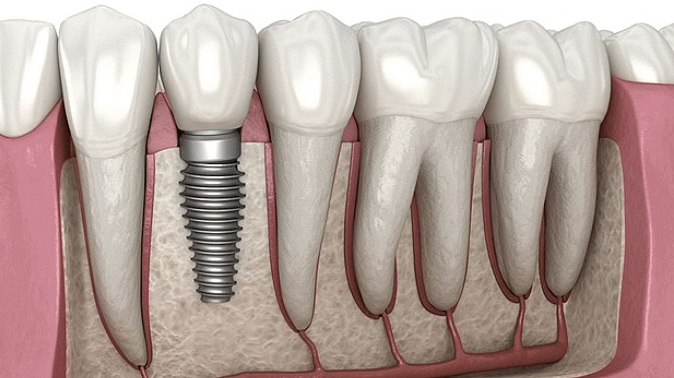When do I Need Dental Implants?

You might need dental implants if you have lost one or more teeth due to injury, decay, or periodontal disease. Implants are a durable and effective solution for restoring both function and aesthetics:
- Single Tooth Replacement: If you have lost a single tooth, a dental implant can be placed without affecting the neighboring teeth, unlike traditional bridges.
- Multiple Teeth Replacement: For those missing several teeth, implants can support bridges or dentures, providing a stable and secure fit without the need for adhesives.
- Full Arch Restoration: If you have lost all your teeth in the upper or lower jaw, implants can support full arch dentures, ensuring they remain securely in place and function like natural teeth.
- Bone Preservation: Dental implants help preserve the jawbone by providing the stimulation that was previously provided by natural tooth roots, preventing bone loss and maintaining facial structure.
- Improved Oral Health: Implants do not require the reduction of adjacent teeth as a tooth-supported bridge does, which improves long-term oral health by preserving more of your natural teeth.
Consulting with a professional like Dr. Edward Doktorman can help determine if dental implants are the right solution for you. Dr. Doktorman can provide personalized advice based on your specific dental needs, ensuring a tailored treatment plan that optimizes both functionality and aesthetics.
Are there any alternatives to dental implants
Yes, there are several alternatives to dental implants for those who may not be suitable candidates or prefer other options. Here are a few alternatives:
- Dental Bridges: A dental bridge is a common alternative to implants, particularly for replacing one or more missing teeth in a row. Bridges use adjacent teeth as anchors, with a false tooth (pontic) in between. This option is less invasive than implants but requires the reduction of the neighboring teeth.
- Dentures: Dentures can be partial or complete, depending on the number of missing teeth. Partial dentures fill in the gaps created by missing teeth, while complete dentures replace an entire arch. Modern dentures are more comfortable and natural-looking, although they may require adhesives and can be less stable than implants.
- Resin-Bonded Bridges: Also known as Maryland bridges, these involve bonding a false tooth to the backs of adjacent teeth using a metal or porcelain framework. This method is less invasive and preserves more of the natural tooth structure compared to traditional bridges.
- Removable Partial Dentures: These are used to replace one or a few missing teeth and can be taken out for cleaning. They are more affordable than implants but may not offer the same stability and comfort.
For personalized advice and to explore the best option for your dental needs, consulting with a professional like Dr. Edward Doktorman is recommended. He can provide expert guidance on whether dental implants or one of these alternatives is the right solution for you.
See also: What is Phlebotomy? A Guide to This Essential Medical Procedure
How do I look after my dental implants
Taking care of your dental implants is crucial to ensure their longevity and maintain oral health. Here are some essential steps:
- Daily Oral Hygiene: Brush your teeth at least twice a day with a soft-bristled toothbrush. Use non-abrasive toothpaste to avoid scratching the implant surfaces. Floss daily with implant-specific floss or use an interdental brush to clean between the teeth and around the implants.
- Regular Dental Check-ups: Schedule regular visits with your dentist to monitor the health of your implants and surrounding gums. Professional cleanings and exams help prevent complications and ensure your implants remain in good condition.
- Avoid Hard Foods: To prevent damage to the implants, avoid chewing on hard foods such as ice, hard candies, or bones. These can crack or chip the crowns of the implants.
- Mouthwash: Use an antimicrobial mouthwash to reduce plaque buildup and maintain gum health. This helps keep the area around the implants clean and free from infection.
- Healthy Lifestyle Choices: Avoid smoking and excessive alcohol consumption, as these can negatively impact the healing process and overall health of your implants. Smoking, in particular, can increase the risk of implant failure.
- Prompt Attention to Issues: If you notice any discomfort, swelling, or unusual symptoms around your implants, contact your dentist immediately. Early intervention can prevent minor issues from becoming serious problems.
By following these care tips and maintaining regular dental appointments, you can ensure the longevity and functionality of your dental implants. For personalized care and advice, consulting with a professional like Dr. Edward Doktorman can provide tailored recommendations to suit your specific needs.
Prestige Dental Inc
1030 Clifton Ave 104, Clifton, NJ 07013, United States
(973) 778-0013
